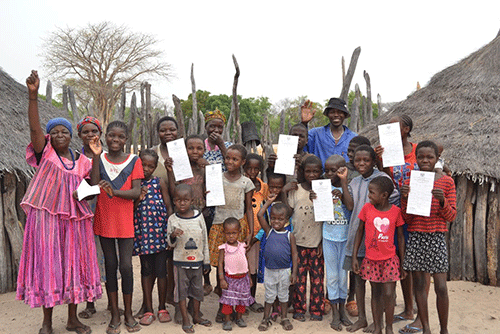The lack of or incomplete personal documentations have been associated with many increasing cases of statelessness but the situation becomes incomprehensible when the person is undocumented in their own country.
Although being undocumented is not the same as being stateless, the lack of identity documents such as a birth certificate has the potential and can lead to statelessness.
A collaboration launched in August 2022 between the home affairs ministry, the US government through the United States Agency of International Development (USAID) and its implementing partner, Project HOPE Namibia (PHN), is in the process of ensuring that many families are now able to obtain birth certificates swiftly and easily at selected mobile processing points.
The campaign is primarily focusing on registering undocumented Namibians to acquire national documents and specifically targets over 4 800 beneficiaries of PHN’s Adherence Retention Project for orphans and vulnerable children.
“I was dismayed when two of my grandchildren were unable to enroll in school because they did not have birth certificates. I felt a sense of duty to ensure that they did not endure a similar fate elsewhere,” said Anastasia Hafunda who hails from Eenhana.
Flanked by nosy toddlers, Hafunda flips through a folder of documents and one-by-one, she excitedly shows the much awaited and precious content – birth certificates for seven of her grandchildren.
“We are very happy to have benefitted from this initiative. Previously, none of the children had birth certificates, making it difficult for them to be officially part of our society or to apply for social grants,” she said, adding that that eight more are currently being processed by the line ministry and will be issued soon.
Up until this moment, 15 of the 21 members of the Hafunda household had never been issued formal birth certificates. Living without them meant that many public services were simply inaccessible, a challenge only exacerbated by the family’s daily responsibilities tending their farm in a remote village far from public service providers.
Similar experiences are felt throughout the country as it is estimated that 10% of Namibians are undocumented.
The Hafunda family solely relied on Anastasia’s insufficient monthly pension to meet their basic needs but with the children now eligible for social grants, their household income has increased significantly.
“I can finally breathe a sigh of relief knowing that my grandchildren will not go to bed on an empty stomach,” she said.
The civil registration campaign has so far issued identification cards and birth certificates to about 700 previously undocumented Namibians in the Oshikoto, Ohangwena, and Khomas regions – the majority of whom are orphans and vulnerable children enrolled in Project HOPE’s Namibia Adherence and Retention Project (NARP).
The campaign will be expanded to Zambezi, Oshana, Omusati, and Kavango East and West in 2023.


